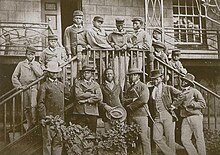 Xhosa graduates at Zonnebloem College in 1860, Cape Town, Cape Colony | |
| Total population | |
|---|---|
| 9,660,004 | |
| Regions with significant populations | |
| 9,415,133 ~ (2022 estimate)
Eastern Cape: 5,102,053 | |
| 200,000[1] | |
| 12,000 | |
| 10,000 | |
| 23,000 | |
| Languages | |
| IsiXhosa IsiZulu, Sesotho, Sepedi, English, Afrikaans | |
| Religion | |
| uThixo, Qamata, Christianity | |
| Related ethnic groups | |
| Southern Ndebele, Zulu, Hlubi, Swati, and Northern Ndebele, Griqua, Khoisan, San people, Khoekhoe, Phuthi people, /Xam | |
| Xhosa | |
|---|---|
| Person | UmXhosa |
| People | AmaXhosa |
| Language | IsiXhosa |
| Country | KwaXhosa |
The Xhosa people, or Xhosa-speaking people (/ˈkɔːsə/ KAW-sə, /ˈkoʊsə/ KOH-sə;[2][3][4] Xhosa pronunciation: [kǁʰɔ́ːsa] ) are a Bantu ethnic group native to South Africa. They are the second largest ethnic group in South Africa and are native speakers of the isiXhosa language.
Presently, over nine million Xhosa-speaking people are distributed across Southern Africa, although their traditional homeland is primarily the Eastern Cape province of South Africa. Their language, isiXhosa, is one of South Africa's most populous languages. The pre-1994 apartheid system of Bantustan assigned them to have self-governing "homelands" (native reserves), namely; Transkei and Ciskei, both a part of the Eastern Cape Province where most Xhosa remain. A notable population also thrives in the Western Cape province of the country. Cape Town (eKapa in Xhosa), East London (eMonti), and Gqeberha (e-Bhayi).
As of 2003,[update] the majority of Xhosa speakers, approximately 5.3 million, lived in the Eastern Cape, followed by the Western Cape (approximately 1 million), Gauteng (971,045), the Free State (546,192), KwaZulu-Natal (219,826), North West (214,461), Mpumalanga (46,553), the Northern Cape (51,228), and Limpopo (14,225).[5]
There is a small but significant Xhosa-speaking (Mfengu) community in Zimbabwe, and their language, isiXhosa, is recognised as an official national language. This community is the remnant migrated from central Africa into South Africa upon the establishment of Rhodesia with Cecil Rhodes.[clarification needed][6]
- ^ Hlenze Welsh Kunju, 2017 Isixhosa Ulwimi Lwabantu Abangesosininzi eZimbabwe: Ukuphila Nokulondolozwa Kwaso, PhD Dissertation, Rhodes University.
- ^ "Xhosa – Definition and pronunciation". Oxford Learner's Dictionaries. Oxford University Press. Retrieved 16 April 2014.
- ^ "Xhosa – pronunciation of Xhosa". Macmillan Dictionary. Macmillan Publishers Limited. Retrieved 16 April 2014.
- ^ Bauer, Laurie (2007). The Linguistics Student's Handbook. Edinburgh: Edinburgh University Press. ISBN 978-0-74862-759-2.
- ^ "SouthAfrica.info". SouthAfrica.info. 9 July 2003. Archived from the original on 22 May 2005. Retrieved 20 December 2011.
- ^ Nombembe, Caciswa (2013). Music-making of the Xhosa diasporic community: a focus on the Umguyo tradition in Zimbabwe. Masters dissertation, School of Arts, Faculty of Humanities, University of the Witwatersrand (Masters thesis).